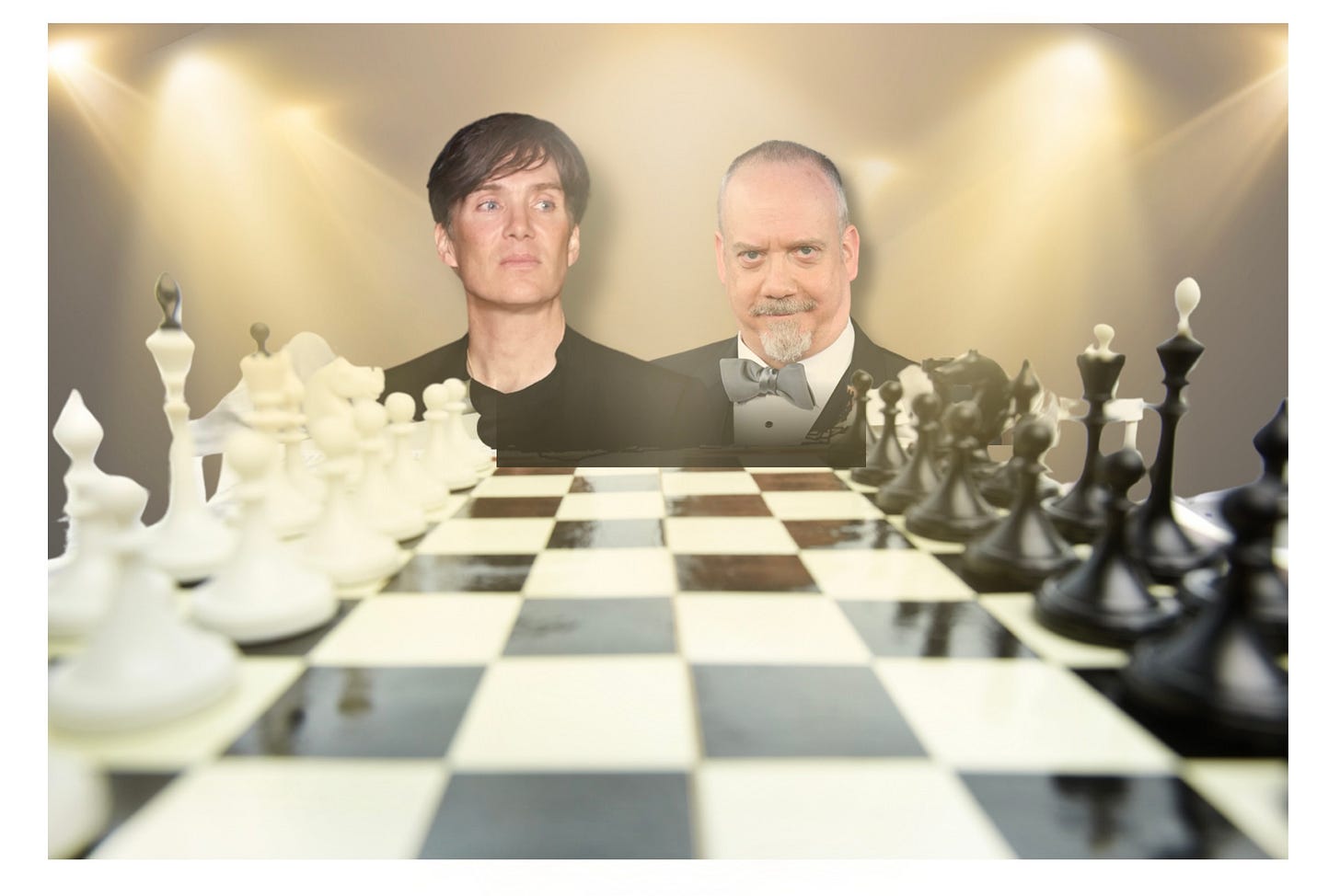Best Actor Slugfest: Oscar's Best Drama
It's Cillian Murphy vs. Paul Giamatti in a rivalry for the ages

In one corner stands Cillian Murphy’s portrayal of the enigmatic J. Robert Oppenheimer as he oversees the creation of the atomic bomb in Christopher Nolan’s Oppenheimer — and then is forced to live with the consequences. In the other corner waits Paul Giamatti’s performance as the fictional prep-school teacher Paul Hunham as he attempts to rule over an unruly classroom in Alexander Payne’s The Holdovers — but then finds himself opening up as he strikes up an unexpected relationship with one abandoned student and the school’s grief-stricken cook.
As their final showdown at the March 10 Academy Awards approaches, the oddsmakers have elevated the two actors as the favorites to take home the best actor Oscar. So let’s take a look at how the contest could yet play out.
The Horse Race So Far
The stage was set for this year’s best actor face-off at the Jan. 7 Golden Globe Awards. Murphy was awarded the trophy for best performance by a male actor in a motion picture drama, while Giamatti was hailed for best performance by a male actor in a motion picture musical or comedy.
A week later, the balance shifted in Giamatti’s favor when the Critics Choice Awards named him best film actor — with more than 580 members in the U.S. and Canada, the group takes a populist stance that often prefigures the Academy’s own taste. This past weekend, though, the pendulum swung back in Murphy’s favor at Britain’s BAFTA awards when he was singled out as leading actor — although he became the first Irish-born actor to achieve that honor, his win could also be read as a bit of a victory for a hometown boy.
This coming Saturday, the Screen Actors Guild Awards will provide the next clue as to where the best actor Oscar could ultimately land. A Murphy win would consolidate his current momentum, while a Giamatti one would give his challenge added life.
But what other factors are in play?
Tackling Role Models
To some extent, choosing between the two actors’ competing performances is a matter of taste. Giamatti’s is the more theatrical, befitting a character whose whole life has been spent performing before a captive audience of impressionable young boys. It also fits Giamatti, who’s always been a “hot” performer, given to big moments. Murphy’s turn is much more guarded and restrained, reflecting a character who’s spent much of his life within the imaginings of his own mind. Similarly, that also suits Murphy’s style, since he’s more often played it “cool” and understated.
On this past Sunday’s edition of CBS’ 60 Minutes — ideally timed to air just before final Oscar voting got underway — Scott Pelley traveled to Ireland to profile the 47-year-old Murphy, who said of his role in Oppenheimer, “I remember reading at the beginning about him that he was more riddle than answer and I thought, ‘Oh, okay, that’s interesting.’” Having spent time researching the scientist — and also losing 28 pounds to achieve Oppy’s lean silhouette — Murphy also testified, “Instinct is your most powerful tool that you have as an actor. Nothing must be predetermined so that you mustn’t have a plan how you’re going to play stuff.”
The 56-year-old Giamatti also got a laudatory profile, sitting down with Leslie Stahl a week earlier on CBS News Sunday Morning. Giamatti — who endured special contact lenses to give his character in The Holdovers a wandering eye — said, “I just play complicated people, people with a complicated relationship with the world,” explaining that his latest role belongs to the long line of curmudgeons he’s played throughout his career.
Beyond the interviews and Q&As they’ve submitted to, there’s another, even less quantifiable factor, that could become a factor . . .
Precedents in Play
Historically — beginning as early as George Arliss’ win for playing British prime minister Benjamin Disraeli in 1929’s Disraeli — the best actor trophy has often gone to actors playing important historical figures. Of the 23 best actor awards that have been handed out since 2000, 12, just over half, have gone to actors portraying real-life characters — among them, Colin Firth (King George VI in The King’s Speech), Daniel Day-Lewis (Abraham Lincoln in Lincoln) and Gary Oldman (Winston Churchill in Darkest Hour). It’s as if the importance that surrounds such men contributes an added aura to the actors who play them.
On the other hand, actors nominated for playing teachers, also a well-worn tradition, have only scored one Oscar victory, way back when Robert Donat took home the gold for playing the title role in 1939’s Goodbye, Mr. Chips. Peter O’Toole failed to repeat that feat when he was nominated for the 1969 musical remake of Goodbye, Mr. Chips — he lost to True Grit’s John Wayne. Since then, there have been at least a half-dozen best actor nominees who have played memorable teachers — among them, Robin Williams in 1989’s Dead Poets Society, Richard Dreyfuss in 1995’s Mr. Holland’s Opus and Ryan Gosling in 2006’s Half Nelson — who’ve seen the best actor trophy handed to a competitor. It’s as if such performances, while appreciated, don’t rise to the level of knockouts. In The Holdovers’ favor: It does take some of the standard teacher tropes into new territory.
Of course, such statistics, while suggestive of underlying biases, don’t necessarily predict the future.
Playing a real-life figure doesn’t guarantee the gold — Oldman, for example, triumphed for playing Churchill but not when he was nominated for playing screenwriter Herman J. Mankiewicz in 2020’s Mank.
And Murphy isn’t the only one playing a based-on-real-life character this year, either. There’s also Colman Domingo as civil rights leader Bayard Rustin in Rustin, and Bradley Cooper as composer Leonard Bernstein in Maestro.
In terms of historical legacy, though, Oppenheimer eclipses the other two. As Robert Downey Jr. says in Oppenheimer — where, as Atomic Energy Commission chairman Lewis Strauss, he plays a sort of Salieri to Oppenheimer’s Mozart — Oppenheimer’s leadership of the Manhattan Project “made him the most important man who ever lived.”
For that matter, though, Giamatti isn’t the only one playing a pedagogue, since Jeffrey Wright’s character in American Fiction begins the movie as a college lecturer, before abandoning academia. His dilemma as he faces off against censorious college kids is as compelling as Giamatti’s attempts to rein in his rebellious prepsters.
But with Oppenheimer currently looking as if it’s steamrolling its way to a best picture win, the 96th Oscars, if the broadcast is going to keep viewers tuned to their screens, could use a good dose of suspense. So if it falls to Murphy vs. Giamatti to provide the title bout, so be it.







